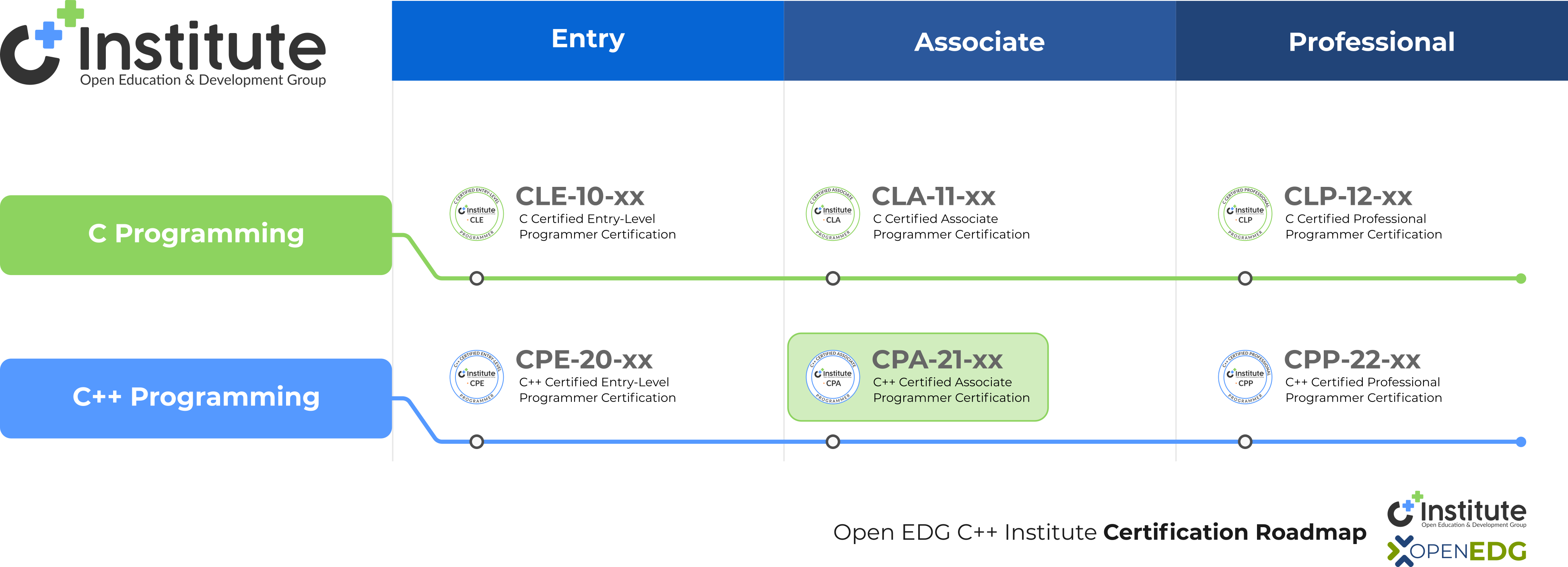CPA – C++ Certified Associate Programmer is a professional certification that verifies your ability to accomplish coding tasks related to core programming concepts in C++ and the fundamental principles of object-oriented programming (OOP). It demonstrates your knowledge of the C++ language’s syntax and semantics, its object-oriented features, and the standard tools used to solve common programming challenges.
By earning the CPA certification, you prove that you can write correct and efficient C++ code, apply object-oriented programming techniques, and understand key language features such as classes, inheritance, exceptions, and pointers. The CPA certification is ideal for those looking to advance their skills beyond entry-level programming and prepare for real-world software development roles.

To earn the CPA – C++ Certified Associate Programmer certification, a candidate should demonstrate the ability to solve typical programming problems using C++. Key knowledge areas include:

Exam name:
CPA – C++ Certified Associate Programmer
Exam code:
CPA-21-0x (x denotes the exam version)
Associated certifications:
CPE – C++ Certified Entry-Level Programmer
CPP – C++ Certified Professional Programmer
Prerequisites:
None
Exam version:
CPA-21-02 (Active)
CPA-21-01 (Retired)
Duration:
65 minutes (exam) + approx. 10 minutes (Non-Disclosure Agreement/Tutorial)
Number of questions:
40
Format:
Single-choice questions, multiple-choice questions
Passing score:
70%
Cost:
From USD 325 (Exam)
From USD 375 (Exam + Retake)
Languages:
English
Learning resources:
C++ Essentials 2 – Cisco Networking Academy (Go to Cisco NetAcad)
C++ Essentials 2 (Intermediate) – OpenEDG Learning Platform (Go to OpenEDG Edube)
Exam delivery channel:
Exam policies:
Click here to go to Exam Policies
Exam syllabus:
Click here to go to Exam Syllabus
Exam Vouchers
Exam vouchers available through the OpenEDG Voucher Store
The CPA certification exam assesses the candidate’s ability to write correct and efficient C++ programs, apply fundamental programming techniques, and use object-oriented programming principles. The exam evaluates knowledge of syntax, program logic, memory management, exceptions, preprocessor directives, and key object-oriented concepts like classes, inheritance, and polymorphism.
The CPA exam consists of 40 questions (items), each carrying a different weight and score value depending on its complexity and objective. Candidates can earn up to a maximum of 200 points, with their total score normalized and converted into a percentage. To pass the exam, a candidate must achieve a cumulative score of 70% or higher based on the total points earned across all questions – the result is not calculated as a simple average of scores per exam block.
The scoring system is based on psychometric analysis, where each question is assigned a weight and point value reflecting its difficulty and importance. This ensures that the exam measures knowledge and skills fairly, with the final score representing the total points earned across all questions, rather than a simple count of correct answers.
Block 1 – Types & Operators
(Exam items: 9 | Weight: 24.5%)
Scope & Keywords: operators, precedence rules, data types, literals, sizeof, std::string methods (compare, substr, insert), arrays, vectors, aggregates, enums, type casting, declaration modifiers.
Block 2 – Control & Exceptions
(Exam items: 8 | Weight: 18%)
Scope & Keywords: if, switch, loops, break, continue, goto, return, try, catch, throw, exception classes, exception specifiers.
Block 3 – Functions & Preprocessor Directives
(Exam items: 9 | Weight: 17.5%)
Scope & Keywords: function declarations, overloading, default parameters, argument passing, recursion, main(), #include, #define, #if, macro expansion.
Block 4 – Pointers
(Exam items: 4 | Weight: 11%)
Scope & Keywords: pointer declaration, dereferencing, nullptr, pointer arithmetic, dynamic memory allocation, new, delete, memory leaks.
Block 5 – Classes & Namespaces
(Exam items: 10 | Weight: 29%)
Scope & Keywords: OOP concepts, class declaration, constructors, destructors, operator overloading, inheritance, casting, virtual methods, const members, friend, namespaces, scope resolution.
A Minimally Qualified Candidate (MQC) for the CPA – C++ Certified Associate Programmer certification demonstrates a solid understanding of C++ programming fundamentals, including syntax, data types, operators, and program flow control.
The candidate is able to apply key programming techniques such as function creation, recursion, pointer operations, dynamic memory management, and preprocessor directives. They are proficient in implementing object-oriented programming concepts – including class design, inheritance, encapsulation, and polymorphism – and in managing namespaces and class relationships.
The MQC can write, debug, and maintain simple to moderately complex C++ programs using the core features of the language and is ready to advance toward more specialized or professional programming roles.
Last updated: July 22, 2025
First published: November 15, 2012
Aligned with CPA-21-02